How To Bootstrap Your Marketing and Become an Established Brand
How do I start marketing my business?
Is Facebook or Google a better platform?
What about influencer marketing?
How much do I need to spend?
Whether you already have an ecommerce business set up or are looking to start one, you will have asked these questions at one point or another.
In this episode of Start Yours, we go full-on into marketing and cover everything from the basics to influencer marketing and building trust. And to do that, we're joined by Erik Huberman, a premium marketer and the man behind Hawke Media, the fastest-growing marketing consultancy in the US that's been valued at over $75 million.
He's got some big names in his clientele list, as well as start-ups and everything in between, including ecommerce businesses.
Keen to grow your business? Then tune in now for Erik's marketing tips and information.
If you enjoy the podcast, we hope you'll consider subscribing. Also, don't forget to hop on over to our blog for more ecommerce and entrepreneurship content.
Have somewhere you need to rush to and prefer a quick summary? Here's a seven-point TL;DR version:
- Anticipate rejection and get used to it. Soon, it becomes a numbers game.
- The three pillars of marketing are awareness, nurturing, and trust.
- Word-of-mouth is still by far the biggest driver in business. Shareability is a lot higher when there's content and not just products.
- If you're not doing it because you innately love what you're doing, it will get miserable.
- The hard sell begets a weak customer because you're forcing someone in versus letting them come to you.
- Use Facebook for lifestyle and brand building and Google to answer an existing demand you've got the answer to.
- The difficult part about influencer marketing is that it's hard to scale in a predictable way.
Start Yours is a podcast about ecommerce, dropshipping, and all things launching a business.
Join us as we meet entrepreneurs who have gone through the triumphs and headaches of running an online store, and learn how they managed to survive and thrive.



Cold-Calling and Dealing With Rejections
Aleisha: Erik, thank you so much for joining me on Start Yours. We are talking all about marketing today. That is the other side of things that I think people quite often underestimate just how hard it is to get your business off the ground and make it happen.
Erik: Yeah.
→ Click Here to Launch Your Online Business with Shopify
Aleisha: What I love about your story is that you had to hustle to get this business that you're currently running off the ground. You started with very little. Tell me a little bit about how you became such a marketing superstar from nothing.
Erik: Yeah. This business is unique and different from the consumer side of things because this really could be built off network and relationships. Meaning I had built and sold to ecommerce companies. I had built a reputation in that way, as well as a network, knowing that I knew what I was doing and how to grow these things.
And so when I started advising and consulting for other companies, it was just a no-brainer for a lot of these people that already knew and had confidence in me to just come and hire me. I made it easy to do so. And so it was a low barrier to entry to work with me and a lot of trust 'cause they had watched and witnessed what I had built myself.
And so that's how we kicked off. It was actually... Don't get me wrong, it took diving into it. It took doing it. It took reaching out to all these people. It took putting myself out there.
But it was pretty straightforward after that because I already had a decent network, which gave me the ability to basically launch Hawke because I had the first few clients in my immediate network.
Aleisha: You network with really big companies. But can we go back to when you were doing that sort of hustle and really trying to approach companies? 'Cause I think a lot of people have a reluctance to cold-call or to put themselves out there. It's really hard. I've done it, and I think it can feel awkward and it's like... I like talking on the phone. A lot of people don't like talking on the phone anymore.
What are some of the tips for early on, especially using your experience that you use to actually approach companies and get yourself in front of them?
Erik: Yeah, I would say get over the cold-call apprehension. You gotta just go for it. I learned that when I was 19 years old and got a sales job selling kitchen knives door to door, and I did that very intentionally to just get used to it.
And then my first job out of college was working as a real estate agent cold-calling for listings. And it's like a lot of other things, the more you do it, the less you care about the rejection and the stress of it. And so if it is something you're resistant to, but you wanna run a business, get over it. Go force yourself to do it. Whatever that number is, you gotta just go for it because once you get used to those cold conversations, it becomes easy and you're gonna have to do it.
I still, at this stage, I don't cold-call for clients, but I cold-call for all sorts of other partnerships. I cold-call for deals I wanna get done, other things that I'm trying to do. And don't get me wrong, even to this day, you definitely get a little bit of adrenaline going because you're like thinking, "What am I gonna say?" Trying to anticipate the conversation.
But you learn to just go for it and kind of like jumping off a high ledge. You just let go and go, and then once you're in it, it's really not a big deal. Like the anticipation is way worse than the actual situation.
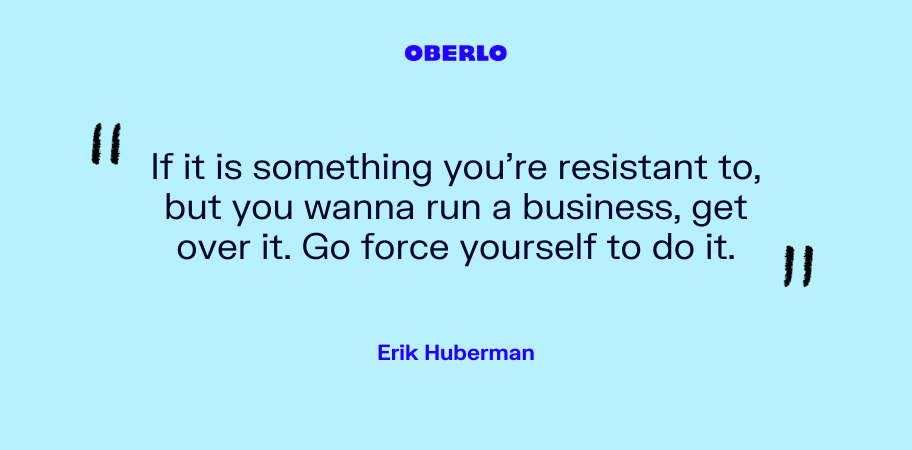
Aleisha: Yeah. I re-entered the world of online dating earlier in the year and had some success, which is great, but it was that first moment of just going, "Oh my gosh, the rejection, I don't want to be... "
Erik: And then you realize it's probably something biological with rejection. I still, I have never studied what it is about, but it really doesn't matter. Someone rejecting you, regardless of whether it's, again, romantically or business-wise, it means nothing. Move on. There is plenty of fish in the sea on both sides.
Aleisha: Yes.
Erik: Learn from it. If you wish they didn't, then figure out what you did that could have helped the next one, but you learn. Like I talk about it all the time with our sales process. Our close rate on our qualified leads is probably 20 percent, which means four out of five times, my team is gonna hear no. And we're a premium brand, we've got all the backing, all the credibility, most of our leads are inbound, coming to us for help, and still, four out of five people tell us no.
Again, so you get over it, and it becomes a numbers game, and you know that that's gonna happen, anticipate that you're gonna hear “no” a lot. And again, you pretty quickly get used to it.
The Three Pillars of Marketing
Aleisha: I wanna go into a little bit of detail about the basics of marketing. I know you do really big campaigns, and I think as we have all said, the world has changed this year. Marketing, I'm sure has changed with how we are approaching making a sale. A lot of our listeners are new to ecom and new to starting a business. It doesn't have to be ecommerce. It could be brick-and-mortar. It could be anything.
Let's talk a little bit about how we approach marketing from the get-go. A lot of time is put into finding products or developing a brand, but then I think people sort of get to that finish line and launch a business and then go, "Nothing's happening. Crickets," because they haven't thought about that. So if you were starting a business today, and I always go back to pot plants because it's just my favorite thing. I just love plants. If you were setting a pot plant business today...
Erik: Oh, funny enough, one of our main venture investments is one of the biggest direct-to-consumer house plant companies in the country.
Aleisha: Great. Great. Well, the Start Yours listeners will go, "Yes, finally, Aleisha's found someone to talk about pot plants."
Erik: Yeah.
Aleisha: If we were to start an ecommerce brand, selling pot plants, can we go through a couple of steps that perhaps you would take with a client and how we would go about marketing the pot plant company?
Erik: Yeah. And the good news is, so we don't just market for big brands, that's a small piece of our business. So our mission statement is "Accessibility to Great Marketing," with the idea of being like, we're the best at what we do, but we'll work with just about anyone that needs help. And so we still work with a lot of startups and a lot of big brands and everything in between.
So whenever we're looking at a marketing campaign, we kinda cover three categories, three pillars of marketing, and we're actually gonna be publishing a book about this.
And so it's awareness, nurturing, and trust.
The idea is awareness is, "How do you gain attention for your product or service? What are the ways to do that?" It could be advertising. It could be press. It could be influencing marketing, a lot of ways to get your brand out there. I'm going into more detail in a sec.
But then nurturing, which is the most important part of marketing and most people miss this, is when someone sees an advertisement or is made aware of your company, chances are they're not buying right away.
There is something called a consideration period or a purchase cycle, or there's a period between when they first are introduced to your product or service and when they actually buy. And if you don't do anything during that period to help bring them along and gain some trust with them, being the third pillar, you generally will see a much, much, much lower conversion rate, much lower return on your advertising and sort of awareness-building.
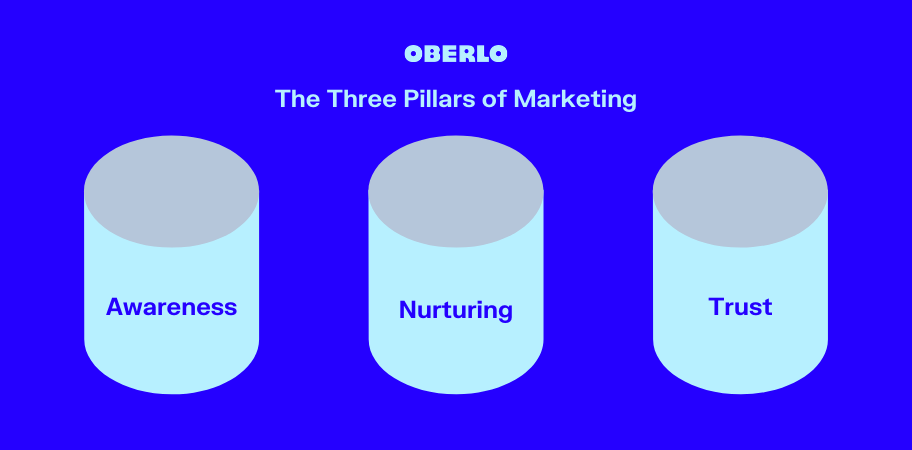
And so with awareness, there are plenty of things to use. You can use Facebook ads, Google ads. If you don't have the money, partnerships are great. Find partners that reach your same audience, partner up with them to reach their audience.
Press, again, can be good, it's a little antiquated at this point. We use press a lot more for trust-building than brand awareness building these days, meaning showing that you've been featured on this site to your existing leads does a lot more than just hoping that it’ll drive you leads.
And then again, with nurturing, once they're in your funnel, collecting their email address, collecting their phone number, using SMS, using email marketing, using chatbots, using other ways to keep in touch with them, it is super powerful.
And probably the most powerful thing that people overlook when it comes to all of this is content.
Because if you're creating branded content… So potted plants, this is a great example. So The Cell is our investment. It's a company called The Cell, and they're on Shopify, and they have a hotline for... If your plant is in trouble, you can call their hotline and talk to them about why your plant's struggling.
Aleisha: I love it.
Erik: It's great. They publish content all day about how to take care of plants, different plants, what to do, different tips and tricks. And so by doing so, when people haven't bought from them yet, they may start digesting that content and go, "Wow, they know all this stuff." Now, they're gonna be a customer.
Also, people are a lot less likely to go share the product page for a specific fiddly fig that they want someone else to buy, versus just saying, "Hey, here's a really cool article about how to take care of your plants," or, "The top 10 plants to have in your house," or whatever.
So the shareability and word of mouth, which is still by far the biggest driver in business is word of mouth, goes a lot higher when there's content and not just products. And you get more nurturing. You get just a lot more engagement in general. And it creates awareness because of that word of mouth and SEO value where people may just discover your content. So content is super important too.
But again, the biggest thing is figuring out if you are doing things to increase and basically bring new people in the funnel, increase your awareness amongst people that have a propensity to buy your product or service.
And then, what are you doing with that awareness? And how are you nurturing that along to both increase your conversion rate and increase your lifetime value? Meaning once they buy once, staying in touch with them, bringing them back, those kinds of things 'cause it's a lot less expensive and a lot more fruitful to do that piece. You still need to fill the funnel. That's why you have to do the awareness piece, but that's also helpful.
And then trust is the third pillar, and it's just when you're early, trust is all about third-party validation.
So press, influencers, testimonials, referrals, word of mouth, content that helps them gain trust with you, all sorts of things. And over time, consistency becomes that trust or as other people call it, “brand.” Whatever your brand stands for, that starts to become more and more prominent and well-known is what becomes your level of trust.
I don't need to get someone else to tell me what I'm buying when I go buy a Coca-Cola. Healthy or not, I know what I'm getting, I trust what I'm getting. It's a Coca-Cola. If you can create that same thing for your brand, which most people can if you just stay consistent, then that can start to replace that trust factor.
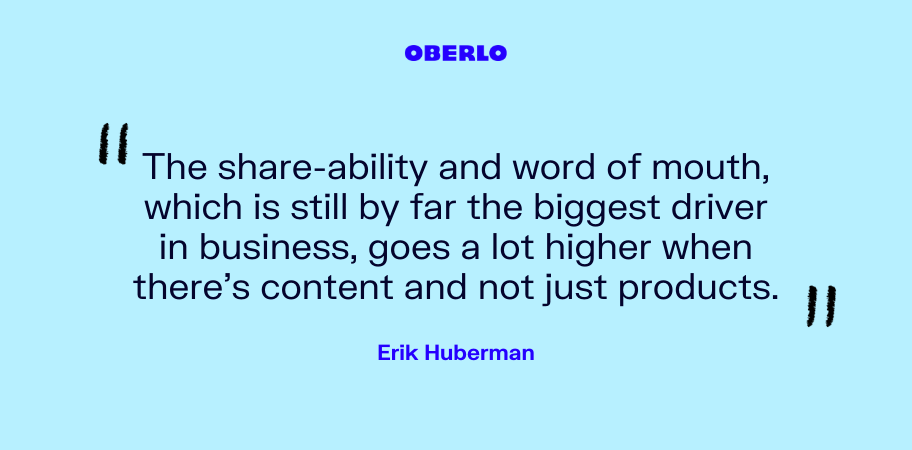
True Signs of Success
Aleisha: 'Consistency' is a word that just comes up so much in this podcast, and I'm so glad you said it, 'cause I think people... There's so much marketing out there about getting rich quick and sitting on Lambos, and I think my listeners are probably really sick of me talking about it, but it is...
Erik: So, I would say... Let me chime in on that real quick...
Aleisha: Please, please.
Erik: 'Cause that's a really... I said this on stage at a conference a few years ago, and I was just spitballing, but it stuck, and it's... So a Lambo, buying a Lambo is not a sign of success. So a Lamborghini can cost, let's say, $2,000 to $3,000 a month. Unless you're kind of a prick, most assistants make well over that in the United States.
So if you have one employee, chances are you're spending more than what a Lambo costs. So to me, when I see someone with a business when they tell me they have 700,000 employees, that's impressive to me. When I see someone pull up in a Lambo, I'm like, okay, so... It's nothing, it literally is... For anyone that owns a business, it means absolutely nothing.
I said this on stage at a Traffic & Conversion Summit, this big marketing summit in San Diego, and apparently, there were four guys in the front row that had all just pulled up in their Lambos and Ferraris, and so everyone just started laughing, and I was like, "What did I say?" It was a room of like 1,500 people, and these guys were all like... They all had their personalized license plate, bright blue and bright yellow Lambos, and I was like... I like nice... I used to race, I love cars.
When I want a supercar, I generally just go out and rent it for the day and get it out of my system. And if you're passionate about it, get it.
But for that to be a sign of wealth and success is crazy to me.
Aleisha: Yeah, I agree, and to me, I think about freedom... Success for me is the freedom of being able to choose what you do with your time and being able to spend time with family and friends and, yeah, sure, not having to worry as much about the next paycheck.
But I totally agree with you, the idea of this opulence. And often, it's just fake opulence anyway. I saw a great post... It just reminded me, someone has built, it was in LA, it was a set of a jet, like a private jet, but you could basically hire this tube...
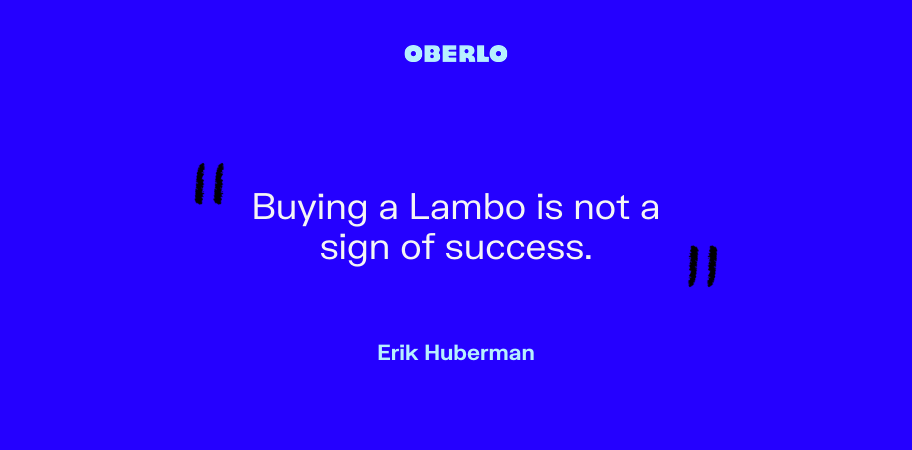
Erik: Yeah, I know him. Matt Monahan built it. He's a buddy, I know him well. And perfect example, yeah, he built a big jet for influencers to take pictures in, and...
Aleisha: Amazing.
Erik: For him, he's an artist, so he likes to do social commentary. He was basically saying, "Look how ridiculous this is," but then it took off. So it was like, nope, people really wanted to take it and... I gotta be honest, I've flown private a lot, and I'd rather fly in business or first class on commercial. They serve you more, it's good food, it's a little more spread out and comfortable, unless...
There are, listen, there are luxury jets that are out there, but general executive jets, it's nice for convenience and just taking off quickly, but again, all this stuff, the flash associated with it is so overrated. And it costs ten times the amount it costs to fly first-class.
Aleisha: Yeah. And it's also, I think... Yeah, and I'm intrigued about your friend, and I think that's great, but yeah, going back to the perception of the social media stuff and people hiring it to have their photoshoots when they're really getting back in their Honda Civic, no disrespect to Honda Civic, I drove one for years, but...
Erik: Great car.
Aleisha: Great car. Thanks, Honda. But, yeah, I think it's... Going back, looking at marketing and what we're selling and the idea there are a lot of people out there selling the idea that you just get things quickly and they're going for their photoshoots on their rented Lambos and in their fake jets when actually it's just emptiness, and... That's not what we wanna talk about today, but I love that you said it.
Erik: No, but I would say, for your audience who is thinking about building their businesses, it touches on two things. One is, you see all these people posting pictures on private jets and in nice cars, know that most of those people that actually share all that all the time are renting and borrowing those things. It's bullshit, so don't...
When you're on social tempted to compare yourself, know that most of them are full of shit, so there's no reason to.
And number two, if that's the reason you're getting into business is so you can buy a Lambo or private jet, just stop 'cause it gets hard. Running a business you started is really, really hard, and if you are doing it for the wrong reasons and not for the innate pleasure of running a business, it's gonna be miserable, and that's where you're...
You see it. And I hate to go too morbid, but there are high suicide rates in entrepreneurship. There are high depression rates in entrepreneurship. And I believe it's because people get into it for the wrong reasons and take all the weight of the negative on themselves.
And the job of a business owner is to deal with the biggest problems of the business. 'Cause if they're not big problems, someone else probably dealt with it. So you're gonna be the vision too, which is super fun, but you're also gonna have the biggest problems roll up to you 'cause of the problems no one else could figure out how to solve. And so if you can't...
If you're not doing it because you innately love what you're doing, it's gonna get miserable.
And maybe someday you'll get a Ferrari and then you're gonna realize, once you get it, it doesn't matter. It's like, it's fun for the first little while. Unless you are a die-hard car... I have a couple of friends that are die-hard... One bought a McLaren and it's his baby and he loves it, and it's awesome to see.
And it's like, cool, that's a prize that he worked really hard for. But he also loves what he does, and he also loves the job. 'Cause once you get it and you check that box, there are a lot of cliches around, "It's the journey, not the destination," and it's true in entrepreneurship. It has to be.
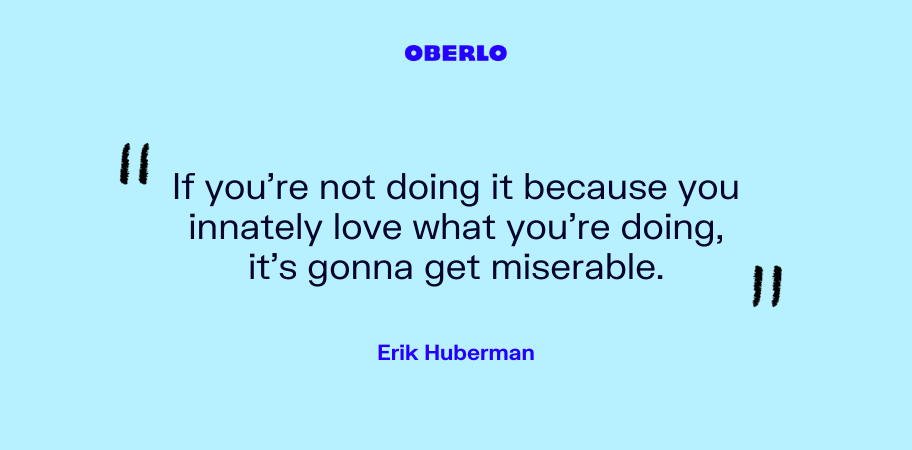
Demonstrate Value
Aleisha: Let's talk a little bit about... You mentioned writing blogs and content is king. At Oberlo, our blog is just full of instructional stuff. You could go nuts bringing people to that sort of site to get people hooked and wanting to learn more, I think that's a really good example, if people wanna check it out, a little plug for us there.
But also, the idea that it doesn't have to be explicit sales all the time. I think people look at marketing and think you have to create an ad that's just screaming at people to buy that thing, but marketing's a lot more subversive than that, isn't it?
Erik: So it all depends on your product or service. I don't like the hard sell.
I think the hard sell begets a weak customer because you're forcing someone in versus letting them come to you.
When they come on their own accord, they've sold themselves. If you have to sell them, unless you have a product that once you're sold, they're out, most companies need that long-term value of a customer, the lifetime value of a customer.
Meaning how many times do they purchase? Do they come back and buy more? Usually what drives most ecommerce businesses is repeat purchasing and customer retention, which means you need people that aren't being sold in, but actually value your product and want it. And so demonstrating value to me is very different from flashy marketing.
And I watched so many ecommerce dropshippers and things like that miss that, and they end up... Like it's the same thing as the Ferrari and Lamborghini story, like they end up telling everyone else like, "Look I sold 500 grand in product yesterday." And it's like, "Yeah, but you spent $600,000 on Facebook, and it's not gonna happen tomorrow 'cause you did something tricky that now everyone's gonna be pissed off and you're probably gonna deal with 30 percent returns," like those stories.
It's one of those things, again, where if it quacks like a duck, it's probably a duck kind of thing. It's like if it doesn't make sense and this person's boasting about million-dollar days and shit like that, and they don't actually see it, and they're spending their time on Facebook boasting about it, they're probably not actually running a business like that 'cause no one has time if they're actually running a business like that.
If they actually took a business from zero to $500,000 in revenue in a month, they don't have time to go share their secrets on Facebook.
And that's what you see a lot of right now is a lot of that BS. So just be careful with all that, and focus on building a good product, like building a good service or product and marketing is easy, and don't get stuck on the get-rich-quick scheme, just build a company.
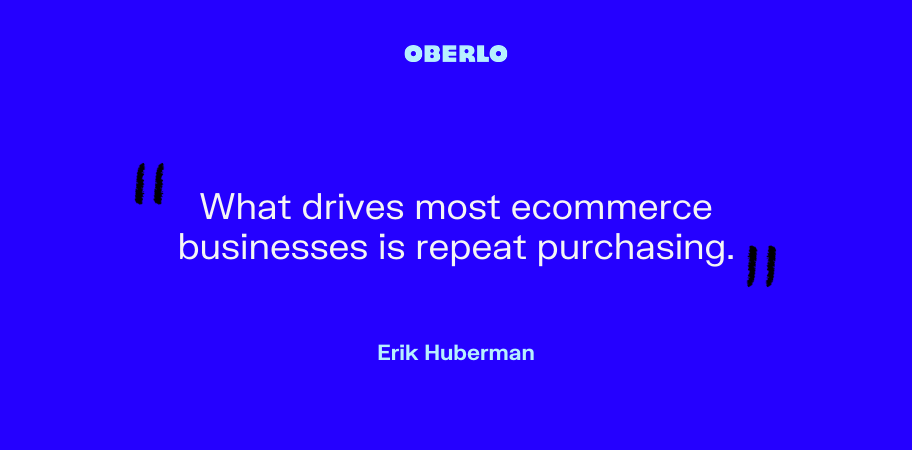
Aleisha: Yeah. If we were looking at Aleisha's Pot Plants, and I'm just launching, I'm very passionate about my company. Do you think it's positive to have a sort of front-facing person, if I am the person to say, "Hey, here are my pot plant holders," 'cause I think a lot of people get quite scared about the idea of doing Facebook Lives or putting their face to the brand. But again, going back to trust, I seem to be attracted... I'm attracted to companies that go, "Hi, I make this."
Erik: Yeah, I think it depends on whether you fit the brand. Let's say you're selling house plants to stay-at-home moms and dads and like the people that are staying at home, and you're a 21-year-old giant bodybuilder guy that's growy and maybe have a fake tan going. That person… Maybe it's gonna be so shocking, you're gonna get the shock appeal and actually get some plants sold. But if you fit your brand, absolutely.
You have to make sure you fit your brand.
Like for us, I'm definitely, I put myself out there as the face of a company. My last company was a women's activewear brand. I don't think that I'd be the best face of the company.
An activewear brand we work with that is awesome, called Shefit, they started with sports bras, it was a Shark Tank company, it's a husband and wife and both are in incredible shape, and it's women sports bras. They can both be the spokesperson 'cause they're a happy couple and she's in great shape and built this athletic company.
So it just depends on the brand, and you have to come to terms with that one way or another. If you can be the spokesperson, it's awesome, as you said, for trust and transparency, it's huge. But you also have to realize sometimes you might not be.
Here we have a guy that constantly advertises his mattress store, and it's a guy in his probably 60s with a really whiny voice that just yells at you on the screen. And it's like, I mean, I can hear it. I've heard that ad probably hundreds and hundreds and hundreds of times. In the past 20 years, it's been the same ad. I'm sure they've gotten business 'cause of where they are, but it's still like, you could have done a lot better. You're yelling at me about the thing I wanna sleep in.
Aleisha: It's so interesting that those... That I suppose that also looks at where... And this leads into the next topic about what we should be spending money on, but it fascinates me that sort of old media, I suppose, TV ads. The guy that is still investing money, but he maybe gets a little ego kick out of yelling at the camera and having a shoot every couple of years and he can sit on his mattresses.
Erik: They don't have any tracking. Like these are old school companies, they don't track any of it. Someone came in at some point and said, "I saw your commercial," and he's like, "That's it, we're doing more."
Aleisha: Yes!
Erik: So, I've been there too. I've made those decisions where I'm like, "Hey, one person said it. There are probably a thousand others, so we're gonna keep doing this."
Marketing With Facebook and Google
Aleisha: Sure. Oh, that's fun. Okay, so money and where we should invest. A lot of people as you did, you started with... What was it? 300 bucks in your pocket. I love that.
Erik: Yeah.
Aleisha: That's a lot of money for a lot of people, but also not that much money when you're starting a business as opposed to figuring out where you put that 300 bucks.
Ecommerce people put a lot of money into developing products and making flashy websites, but also as we said at the top of the show, it can be tricky when you go, "Oh, how the hell do I get this message out there? How much money should I spend?"
So this is a bit of a broad question, but how can we invest our money in marketing and where should we be putting it broadly?
Erik: So there are a few parts to this. One, it depends on where you're coming from. Even two companies ago, we were bootstrapped too. Like I hustled for press, we had no money, I had zero money, so I was like, "We gotta go figure out how to do this for free.”
And so we always talk about the trade-off between time and money, when you're starting out and have no money, well, then you have plenty of time, and if you don't have either, if you're spending a ton of time on things and not making any money, then you're already doing something wrong.
So your time should be pretty open until you're making money 'cause you should be focused on finding ways to make money.
And so that's always how it is in the beginning, it's all the things that don't cost directly. Again, like press, word of mouth, maybe some guerilla marketing tactics and things that you can do to try to get it out there in a sort of viral way, things like that. It's all hard. Don't get me wrong, and this is not like, just do this and you're gonna be successful. It's trying a bunch of different things and keep trying until it catches on.
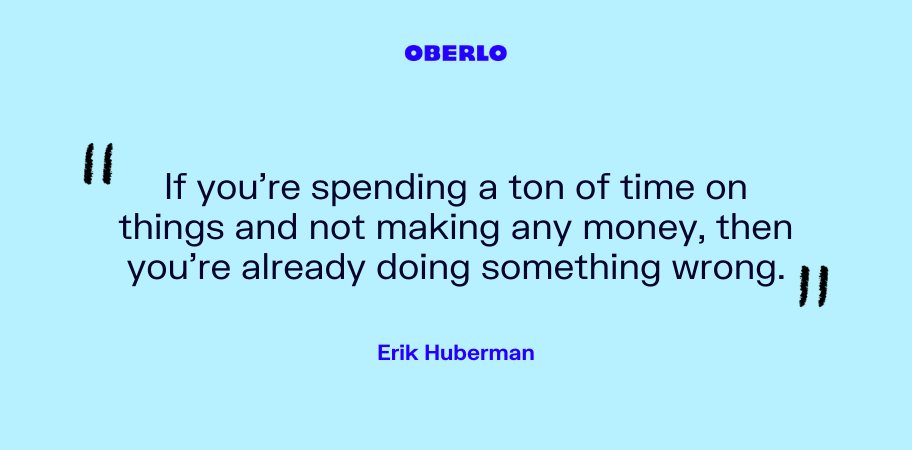
And again, if you have a good product or service, every time you get a customer, they're gonna tell other people. So then you get this multiplier effect as you build it, and that gets a multiplier effect.
So time and a good product or a service helps a lot. But you have to keep kick-starting that to get it to accelerate fast enough for this to be sustainable for you too.
When you have money, then it comes down to where to advertise, where to spend that money. To give a little anecdote, when you're looking for where to advertise, think about the context in which the people receiving the advertisement are in 'cause it's not hard to reach your demo anymore. That's a very antiquated model where most traditional agencies will still talk about like, "Well, is your demo on Facebook, or is it on TikTok?"
The answer is they're on everything. Facebook has two billion active users a day. Everyone's on Facebook in terms of demo, and so it's not about that, it's about what they're doing when they receive it.
A good example is Facebook versus Google, both prominent platforms. But Facebook, the way people use it, they're sitting just scrolling through their newsfeed, doing nothing productive. You sit there, you swipe up, swipe up, swipe up, and you're looking at all these different things, and basically what you're saying is you're bored.
And so it's a perfect time to hit someone because they're doing nothing else, it's like, “I'm bored, I'm just scrolling through Facebook.” Perfect, I'm gonna show you something interesting. And because of their targeting methodology and their user base, you can basically hit exactly who your customer is at a time when they're telling you they're bored, with copy and creative like advertisements that you hopefully can test to figure out what is the best advertisement to serve them. So it's a great platform for advertising, that's why it's so successful. TikTok shows similar behaviors to that.
The problem with Facebook is timing. If I have a product that serves a specific need, that's a timing-based need, let's say I'm a DUI attorney. I help drunk drivers when they go into court. If I'm that person, I can't just... What am I gonna target on Facebook? Anyone that likes alcohol? There's not really a way to find those people.
And so that's when Google comes in. Google, instead of being just a place where, for lack of a better word, you can create demand for a product with your target audience, Google is a place where you answer existing demand.
So you can create new demand on Facebook, but answer existing demand on Google 'cause all it is is someone's searching for something and I've got the answer.
It's that simple, that is the context. And you can still target by demo and do all that. But you're saying... So now, again, if someone Googles, "I need a DUI attorney," or, "I got a DUI," perfect time to advertise to them.
But the counter-argument to that is Google isn't very lifestyle-driven. If I've created the best new running shoe, and someone Googles for running shoes, and you've got Nike, Adidas, and Hawk running shoes, I've heard of Nike and Adidas, and not Hawk, so I'm gonna go with the other two.
So it becomes really hard until you've built a brand to drum up or to answer any existing demand on that platform. And that's where Facebook comes in better. So for lifestyle and brand building, Facebook's better. For answering an existing demand when you've got the answer, Google is better.
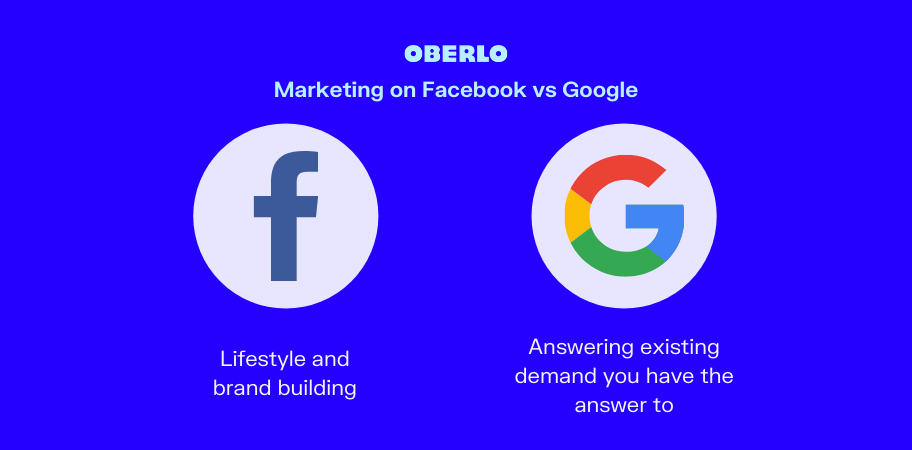
Aleisha: I suppose it also comes back to what you were saying about writing the instructional stuff. If I'm selling my pot plants and I'm talking about how not to kill a succulent, and someone Googling “my succulent is dead,” then I suppose with Aleisha's Pot Plants, we could definitely set that up, that would be a great way to always answer that question, with a great article.
Erik: And that shows that that person's a succulent buyer, they have a need, that's where it's very straightforward, versus Facebook where you can't target the person looking for succulent help, but you can target a homeowner in their 30s that likes plants and likes a bunch of gardening websites. You can go for the person who’s probably gonna wanna buy plants.
And you're gonna get a much wider audience on Facebook than you are on Google because you're not just waiting for someone to come to you.
Aleisha: And the good thing is as we... And again, there are so many different instructional videos about how to do this, but if you are doing your due diligence with Facebook with that angle, but then also coming in from Google, we can re-target through Google people straight away and then send them back to Facebook and then we're back again, you've got your target. Yeah.
Erik: Yeah. And I will say that if I was launching a new brand today, I probably would want to have at least about a quarter-million dollars in marketing to really get it off the ground. If you're starting with less than that, then you have to be really scrappy.
If you wanna do the more real launch testing, optimizing thing, you need about $250,000 in marketing.
Should You Use Influencers?
Aleisha: Which is amazing. And if we had it, a lot of our listeners I'm sure would spend that. What is the deal with influencer marketing now? Do we buy them? Is it bullshit? Is it something that we should be focusing on?
Because actually, I was reading an article the other day about how COVID and influencers because people can't go anywhere or a lot of people are quite restricted, the sexiness of influencers has faded a little bit in certain areas. So should we be sending them stuff and paying them lots of money to go, "Hi guys, this is my stuff." That's very negative of me. I'm sorry.
Erik: No. You're fine. Yeah, no, it's way less effective than it used to be, mostly because of the regulations, at least in the US, around the FTC regulations that they have to disclose that they're doing it being paid. And that really hurt, in my opinion, more micro-influencers than it did major influencers because major endorsement deals have been around forever, and they still will work.
Like Michael Jordan and Nike like, yeah, everybody knows he was paid for that. He still sells more shoes than anyone.
So it's not an issue of being paid. It's that anyone with a BS following of 10,000 people was getting paid and their actual reach to their audience, it's negligible, so if you treat it more like another advertising channel, with a good content creator... So they're gonna create the ads for you, 'cause they know how to create content for their audience, and they're gonna reach their audience in a certain way, and you look at the impressions they get, the clicks they get, etcetera, then there's something there for sure. It's just another great advertising channel.
The difficult part is at scale, it's the Wild West. It's hard to scale it in any predictable way, so that's where it gets hard. But I still think that there's value to it as a part of your diversification 'cause they do build some trust, they build some validation. It's a really good brand play if you grab the right influencers. You go to the wrong influencer like, "Hey, look at the product that I got sent," but if it's someone that really does stand for what your company stands for, it can be really good.
But that's part of it too, going after just some other fashionista blog blogger, it just is a pretty looking girl that posts with clothes, like that's not gonna do much. But if you have some sort of principle your company stands on and there's someone else out there that stands for that, that's usually good alignment, it's the brand alignment that's more important.
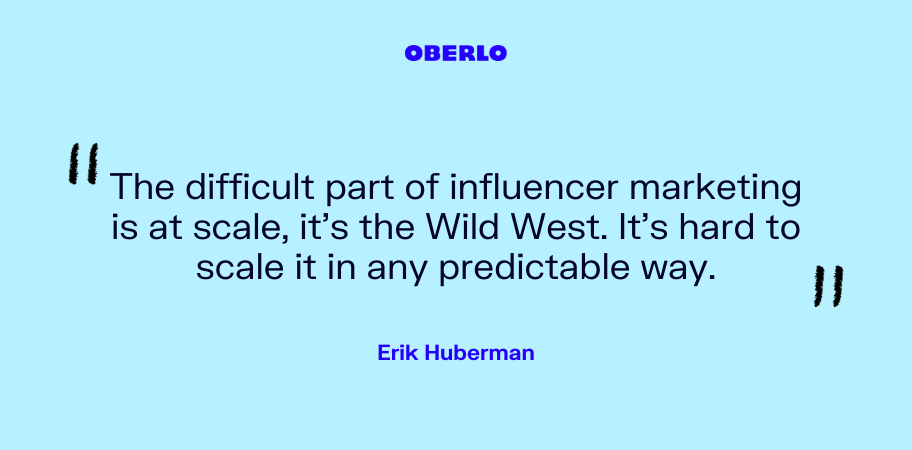
Aleisha: If Aleisha's Pot Plants was trying to find people to put my gorgeous pot plant holders in their home, then would I supposed I’d look for people in the niche of either home renovations or design or micro-influencers that are good at like... There's a great IKEA hack that I always love. I get sucked into people redesigning things. So we would look for those, we'd niche down to find people that are specifically featuring that sort of stuff.
Erik: It's either that or you go way up and you go for the celebrity that fits the brand image you're going for. People already know that celebrity and it basically elevates your brand and makes you associated with that.
A lot of brands have done that really well. Fabletics with Kate Hudson, things like that. Yeah, so a perfect example, like Kate Hudson has a brand, people knew who she was, and so, in shape, mom, pretty girl, there's a whole list of things that could be there and that made the Fabletics stand for that immediately 'cause it's her brand.
But that's where it gets on a bigger picture. It's the in-between that's hard.
You either niche down and get the people that are super focused or you go up. It's the random 100,000, 200,000, 300,000-follower bloggers that cost a decent amount of money and don't really mean anything.
Aleisha: Yeah, yeah. And also, as you mentioned, making sure if you're working with an influencer, that you've got ways to track what they're doing. You're not just saying, "Hi, can you feature my product?" and then it's just out in the wilderness and there's no way to figure out if it's actually worked for you.
Erik: Yeah, exactly.
It’s All About Building Trust
Aleisha: The other thing you mentioned earlier and I think it's really good to just come back on is if you are selling a product and people like your product, and maybe this is also about the fear of approach again, but making sure that you have something set up where you can say, "Hey, did you like my product? Would you share a photo?" 'Cause those sorts of testimonials are really powerful. I know as a buyer I'm like, "Oh, that's a real person wearing this dress, not just the model. I wanna see it."
Erik: Yeah, no, I agree. And again, it's all that trust-building. Especially early on, that's huge. 'Cause also, for anyone noticing all the dropshipping and all the early-stage Shopify companies, China has been awful recently in terms of running Instagram ads to some random Shopify sites selling something that looks great in the picture, and then you get it and it's a piece of crap. And it took six months to get here, and you're emailing them, and they blame COVID. My wife and I've dealt with this a few times of ourselves, and it's like it stops people from wanting...
Aleisha: Yes. Me too.
Erik: Yeah, it stops people from wanting to buy anything, and so that's what you're up against now. You have to build that trust and efficacy.
Aleisha: Yeah, we bought a couch cover recently. That was a piece of crap. And also working in the industry, where I think now, I'm pretty good at spotting... And this is not a diss on... I think dropshipping is great, and as you said, it's just finding the companies that are legit and that are selling what they're actually advertising. But, yeah, we got caught. We bought a piece of crap couch cover, and I resent that thing every day. I look at it and just go, "Damn you!"
Erik: My favorite is a friend of mine bought... And the picture it's awesome. It's like this storm cloud, about this big, and it looks like a cloud, but it has lights in it. And so it lights up and looks like lightning is shooting around, and you just... It's supposed to be a light you put in a corner, but it was like a little storm cloud going off in the corner. And then she showed the unveiling of the box, and it was like two bundles of cotton swab and there was a flashlight. And I was like, "Come on."
Aleisha: Create your own storm.
Erik: Yeah, exactly.
Aleisha: I will say, as someone who does purchase things off Instagram and Facebook, that a couple of lines really goes a long way for me as a customer. And also the sweet spot I was noticing the other night when I was looking at. When I order, not to say I get hammered and buy things, which has happened, but just a couple of just easy after-dinner drinks that between 8 and 10 o'clock at night is when I'm hitting that button.
Erik: Yeah, it used to be while people are at their desks at work, but I think with working from home it's less of a thing. And so now, we're seeing the same thing. Evening time, I've made the mistake. I wake up in the morning and go, "What did I buy on Amazon?"
Aleisha: Yeah. What's this shipping notification?
Erik: It showed up. We have a 12-foot blow-up ghost for our front lawn that I bought the other night.
Aleisha: Hey, enjoy it for this time of year or keep it there for the rest of the year. I mean, there's no limit.
Erik: I might.
Aleisha: Hey Erik, tell me a little bit more. You said earlier, you work with companies of all sizes. Obviously, we have a lot of people who are... Well, not obviously, we have a lot of people listening who have big companies, but also who are just starting out. Can we encourage people to get in touch with you if they want a little bit of advice? What can you offer them?
Erik: Yeah, I mean, that's literally what we do. You can literally sign up on hawkemedia.com. We'll do a free consultation and say, "Here are the things you need to be doing," and if they're not ready to work with us, we'll still give them guidance on the things they should be doing to get there.
And it happens to us all the time, so we're really happy to do it, where someone will come to us, not be quite ready to hire anyone yet. So we still start at $1,500 a month, but $1,500 a month, so it costs money. If someone's cheaper than that, be very careful what they're gonna be...
We have a lot of economies of scale that we're able to do that now, we weren't able to hit that pricing before. And so be super careful when it's cheaper, and usually, if you're not at the point where you can spend about 10 grand a month on marketing, the CEO should still be the main marketing and salesperson. And at that point, we always give advice and guidance on like, "Hey, here are some things you could try."
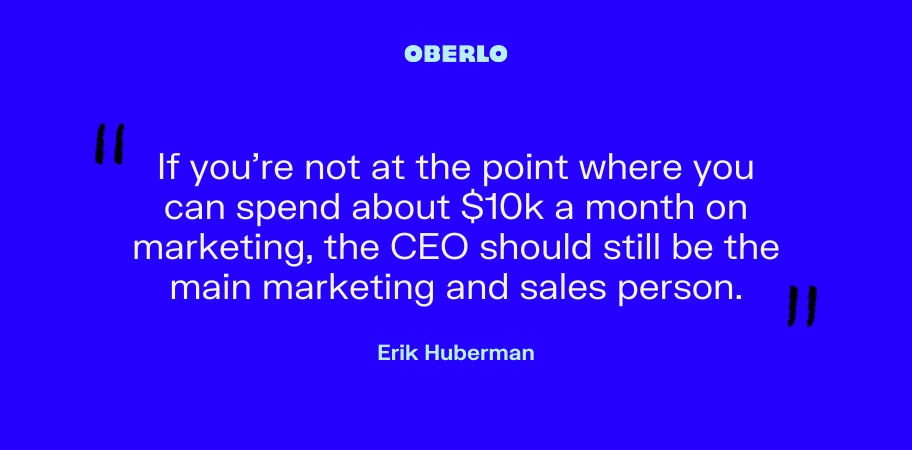
Aleisha: That's good. I think if you can work with a consulting company that can, actually like yours, that can say, "Hit these four things and then you can... That'll drive you to the $10,000 mark." And then they're working with you, as you said, building trust, finding people that you can have the consistency of success. It's great.
Erik: The other fun thing, as I mentioned before, we have our podcast, which is Hawke Talk, and it's literally the origin stories of really incredible people. So that's another fun one if you wanna hear about how people got to where they are, whether it's NBA All-Stars, NFL players. We got Gary Vaynerchuk on it last week, so a lot of fun people.
Aleisha: Great. Love a bit of Gary. Was that intense?
Erik: No, I've known him for a long time, so I get along with him well. Very New Yorker, don't get me wrong.
Aleisha: Oh yeah, I like... If I've gotta be in a certain mood, he sort of gees me up. I can listen to him and just go, "Alright. Alright. I'm good." And other times, I need to go and just do the Headspace app for a while and have a little think about my life.
Eric, it would be so great to have you back on the show if you are willing and open to do that, 'cause I think you have a lot to share.
Eric: Yeah, thank you.
Aleisha: And I've got a lot more questions to ask you, but... Let's have you back and talk a little bit more about advanced marketing next time.
Eric: Sure.
Aleisha: And where we're heading as well, we didn't even really cover it but heading... I was gonna say post-COVID, but who am I kidding? Where we're heading into 2021 and how we should maybe look into marketing, especially with so many online businesses launching.
Eric: I'm gonna say, the nicest thing to know about online businesses is even though tons of people are launching them, the market share in terms of consumer spending, at least in the US, went from 13 percent consumer spending online to 30 percent, and it's dropped down to like 27 percent now that the US is somewhat open.
But it's gonna maybe level out at 25 percent, it's not gonna go back down to 13 percent, so the addressable market has massively grown, so there's a ton of opportunity, and I don't think most people have taken advantage of it yet.
Aleisha: No, I totally agree. I think we're seeing a lot of the same sort of stats within Oberlo and Shopify, just seeing people who are especially transitioning from brick-and-mortar and trying to find a solution to not going out of business, but also being able to sort of adapt to the current world that we are living in.
Eric: Yeah.
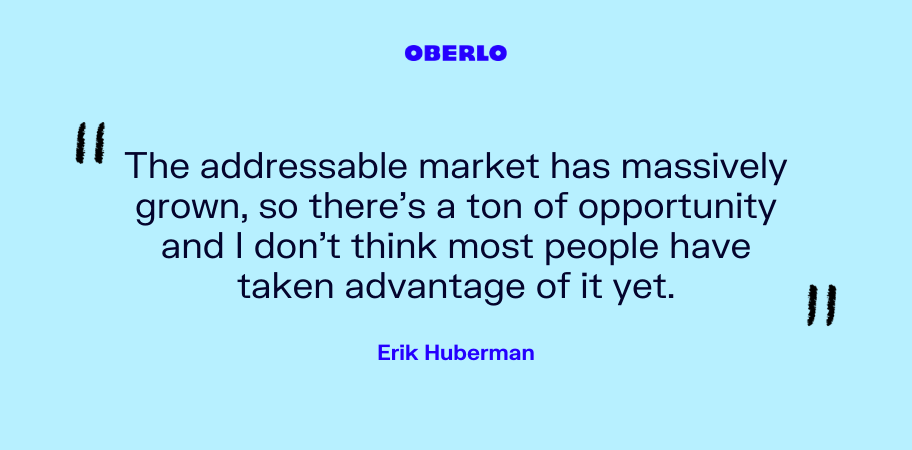
Aleisha: So it's exciting and lots more to say. Eric this has been a delight, thank you so much for your time.
Eric: Yeah, thank you.
Aleisha: And really look forward to chatting again in the future.
Eric: Me too, thanks for having me.



Want to Learn More?
- Top 50 Ecommerce Resources To Grow Your Business
- Bootstrapping a Business: 10 Tips to Help You Succeed
- How To Market a Product: 24 Effective Marketing Tips To Skyrocket Sales
- How To Succeed With Marketing During the COVID-19 Pandemic
- Have a Low Starting Budget for Marketing? Go With Influencer Marketing.